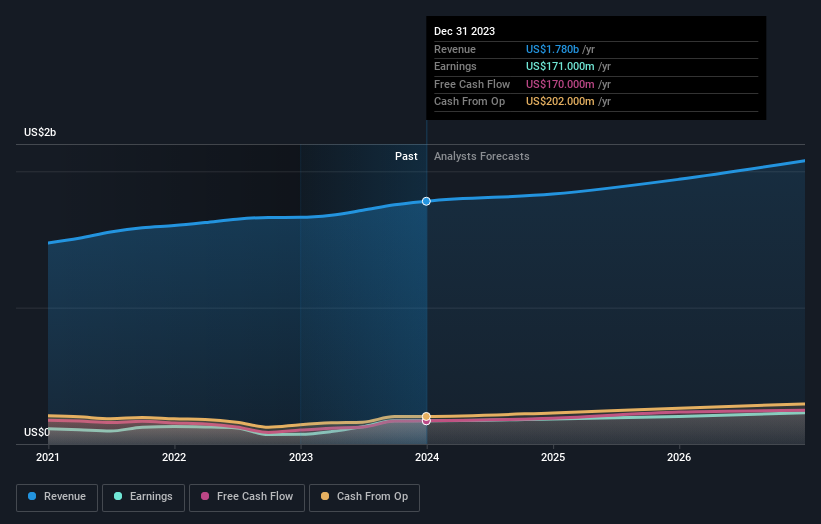Analysts Have Made A Financial Statement On Frontdoor, Inc.’s (NASDAQ:FTDR) Full-Year Report

Shareholders might have noticed that Frontdoor, Inc. (NASDAQ:FTDR) filed its annual result this time last week. The early response was not positive, with shares down 5.6% to US$31.14 in the past week. The result was positive overall – although revenues of US$1.8b were in line with what the analysts predicted, Frontdoor surprised by delivering a statutory profit of US$2.12 per share, modestly greater than expected. The analysts typically update their forecasts at each earnings report, and we can judge from their estimates whether their view of the company has changed or if there are any new concerns to be aware of. So we collected the latest post-earnings statutory consensus estimates to see what could be in store for next year.
Check out our latest analysis for Frontdoor
Taking into account the latest results, the consensus forecast from Frontdoor’s seven analysts is for revenues of US$1.83b in 2024. This reflects a credible 3.0% improvement in revenue compared to the last 12 months. Statutory earnings per share are predicted to rise 6.2% to US$2.32. In the lead-up to this report, the analysts had been modelling revenues of US$1.88b and earnings per share (EPS) of US$2.30 in 2024. The consensus seems maybe a little more pessimistic, trimming their revenue forecasts after the latest results even though there was no change to its EPS estimates.
The consensus has reconfirmed its price target of US$40.20, showing that the analysts don’t expect weaker revenue expectations next year to have a material impact on Frontdoor’s market value. That’s not the only conclusion we can draw from this data however, as some investors also like to consider the spread in estimates when evaluating analyst price targets. There are some variant perceptions on Frontdoor, with the most bullish analyst valuing it at US$45.00 and the most bearish at US$31.00 per share. This shows there is still a bit of diversity in estimates, but analysts don’t appear to be totally split on the stock as though it might be a success or failure situation.
Looking at the bigger picture now, one of the ways we can make sense of these forecasts is to see how they measure up against both past performance and industry growth estimates. It’s pretty clear that there is an expectation that Frontdoor’s revenue growth will slow down substantially, with revenues to the end of 2024 expected to display 3.0% growth on an annualised basis. This is compared to a historical growth rate of 6.8% over the past five years. Compare this against other companies (with analyst forecasts) in the industry, which are in aggregate expected to see revenue growth of 12% annually. Factoring in the forecast slowdown in growth, it seems obvious that Frontdoor is also expected to grow slower than other industry participants.
The Bottom Line
The most obvious conclusion is that there’s been no major change in the business’ prospects in recent times, with the analysts holding their earnings forecasts steady, in line with previous estimates. Unfortunately, they also downgraded their revenue estimates, and our data indicates underperformance compared to the wider industry. Even so, earnings per share are more important to the intrinsic value of the business. Even so, earnings are more important to the intrinsic value of the business. There was no real change to the consensus price target, suggesting that the intrinsic value of the business has not undergone any major changes with the latest estimates.
Keeping that in mind, we still think that the longer term trajectory of the business is much more important for investors to consider. We have estimates – from multiple Frontdoor analysts – going out to 2026, and you can see them free on our platform here.
Even so, be aware that Frontdoor is showing 1 warning sign in our investment analysis , you should know about…
Have feedback on this article? Concerned about the content? Get in touch with us directly. Alternatively, email editorial-team (at) simplywallst.com.
This article by Simply Wall St is general in nature. We provide commentary based on historical data and analyst forecasts only using an unbiased methodology and our articles are not intended to be financial advice. It does not constitute a recommendation to buy or sell any stock, and does not take account of your objectives, or your financial situation. We aim to bring you long-term focused analysis driven by fundamental data. Note that our analysis may not factor in the latest price-sensitive company announcements or qualitative material. Simply Wall St has no position in any stocks mentioned.
Source link






